
Guests
- Lina Yassinclimate diplomacy researcher at the International Institute for Environment and Development in London.
Sudanese climate diplomacy researcher Lina Yassin is supporting the Least Developed Countries Group at the U.N. climate summit in Belém, Brazil. The group is composed of 44 countries, including Sudan, whose cumulative emissions amount to less than 1% of total global emissions. “They are the countries that have the least amount of resources to respond to the climate crisis,” explains Yassin.
Yassin also discusses the humanitarian crisis in Sudan, where the estimated death toll is now at 150,000. “This is a proxy war funded by foreign nationals who have vested interests in Sudan’s resources. … The UAE has been using the RSF militia to illegally smuggle gold out to finance the war and finance their own gold reserves. The UAE is also really interested in Sudan’s agricultural lands.”
Transcript
AMY GOODMAN: We’re broadcasting from the U.N. climate summit, COP30, from the Brazilian city of Belém, the gateway to the Amazon. I’m Amy Goodman.
We’re joined right now by Lina Yassin, who supports the LDC Group. That’s the Least Developed Countries at the U.N. climate summit. She’s a climate diplomacy researcher at the International Institute for Environment and Development, or IIED, in London. She’s from Sudan, previously supported the Sudanese delegation at the COP.
We’re going to talk to you about the crisis in Sudan in a moment. But first, talk about why you’re here, and as — not using technical terms, or if you do, tell people what exactly you mean, whether you use words like “adaptation” or “loss and damage.” I think, to the outside world, they think, “We can’t just deal. We can’t understand what they’re talking about.” But talk about the progress and the lack of progress at this COP.
LINA YASSIN: Thank you for having me, Amy.
So, I’m here because, like you mentioned, the Least Developed Countries is a group of 44 countries. Those countries contributed the very least to the climate crisis. Their cumulative emissions amounts to less than 1%. Yet those countries, amounting to over 1 billion person, are suffering the worst of the climate crisis. They are the countries that have the least amount of resources to respond to the climate crisis, including my country, Sudan. So I’m here because we are supporting these countries in the negotiations to come up with outcomes that don’t just sound great, but actually work on the ground.
My focus is on adaptation. And adaptation negotiations are incredibly important, because adaptation is as simple as farmers knowing how to deal with the unpredictable rainfall and the crop failure. It’s as simple as communities needing to rebuild after a flood or after a cyclone. It’s as simple as hospitals being able to function when the storm has cut off the electricity, when they have to deal with a cholera outbreak, a malaria outbreak. Adaptation is incredibly practical. It is water. It is housing. It is basic human safety.
AMY GOODMAN: And how can other countries help with that? What does Sudan need, for example?
LINA YASSIN: The LDCs and Sudan need finance. Unfortunately, adaptation cannot work if there’s no money on the ground to actually finance it. And adaptation is fundamentally a public good. Building infrastructure, investing in infrastructure so that countries can survive floods, cyclones, hurricanes, has to come from public finance. And right now, unfortunately, the finance conversation is the most uncomfortable conversation to have in this space. The UNEP Gap Report, the 2025 Gap Report, has said that in order to actually finance adaptation properly, we need $310 billion per year for developing countries. Right now developing countries are getting $26 billion.
AMY GOODMAN: So, you might have people in the United States saying, “OK, Sudan’s suffering, as are other least developed countries. It’s not our fault. We need money in the United States. Why should we give money to other countries?” Can you talk about the responsibility of the most polluting countries?
LINA YASSIN: Yes, and we can go back all the way to the Industrial Revolution, where many developed countries and wealthy countries have benefited from the exploitation of coal and fossil fuels and have built and established themselves as wealthy countries, whilst other countries did not have that chance. So, now we find ourselves in a predicament, because we need to stop emitting carbon emissions, and we need to stop — we need to start responding to the crisis, but countries like my country need to develop. So, there is an element of justice and fairness, where we need to be able to support those countries, because right now their development is far behind the rest of the world, and they need to be included in this conversation.
And the reason — another reason is climate change doesn’t know border. What’s happening in my country, what’s happening in other countries will eventually get to other countries. It’s a collective responsibility, and we need to remember that climate change is — touches us all.
AMY GOODMAN: So, let me ask you about the funding cuts from USAID and how that impacts these discussions, as well as funding cuts from the U.K. and the European Union.
LINA YASSIN: It’s really unfortunate that we find ourselves — at the time when the climate crisis is increasing, when the evidence are even more scary, we find ourselves in a situation where governments are scaling back on their budgets and on aid budgets. The U.S. is also leaving the Paris Agreement. This is going to be the last year where the U.S. is officially part of the Paris Agreement. So, this is — it has a big negative impact, because this whole system, this negotiation is built on trust. Multilateralism can only work if everyone does their fair share. And we’re finding ourselves in a time where budgets are being rerouted to military spendings, even though when we talk about security and investing in national security, we should be talking about climate change. That’s the biggest security threat that every country is facing right now.
AMY GOODMAN: What is the Just Transition Work Program?
LINA YASSIN: So, the just transition is another incredibly important conversation, because right now we’ve established that we need to stop oil demand. Oil needs to peak. Fossil fuels need — we need to transition away from fossil fuels. But how do we do that while ensuring no one is left behind? So, the Least Developed Countries and other developing countries are saying, “Our development will be impacted. How do we make sure we transition to low-carbon economies, green economies, while ensuring our people get jobs, our people get rights, and we can still develop while we solve the climate crisis?”
AMY GOODMAN: And talk, overall, about the energy transition.
LINA YASSIN: Yeah, so, the energy transition is another uncomfortable conversation, unfortunately, in this space. When we come here to talk about climate change, you would expect us to be talking mostly about fossil fuels, because the fossil fuels is the main driver of carbon emissions. But fossil fuels are rarely mentioned in these spaces. It’s the word that no one wants to say. It’s the elephant in the room.
AMY GOODMAN: But, of course, it’s the word on the tips of the tongues of, what, the 1,600 lobbyists who are here?
LINA YASSIN: Yes, and that’s another conversation to be had. This space is highly influenced. This space has a lot of — many, many lobbyists who are highly influencing countries and governments to weaken outcomes, to slow down this process. So, we need to be talking about this. But we also need to be more explicit about the fact that the time — climate change is not waiting for us. And we can’t be using a multilateral space, the only space that our countries have to be — to have strong outcomes, and we’re being told, “You need to — you need to take it step by step, incremental, slow, slow steps.”
AMY GOODMAN: So, I want to — I want to shift our discussion right now to what’s actually happening in Sudan. The U.N.'s humanitarian chief, Tom Fletcher, is urging immediate and unhindered access for aid agencies to the besieged city of El Fasher, which was recently captured by the UAE-backed RSF. That's the Rapid Support Forces. Tens of thousands of city residents remain unaccounted for. Last month, we spoke to Nathaniel Raymond of the Yale Humanitarian Research Lab, which has been using satellite imagery to monitor what’s happened in El Fasher. Let’s take a listen.
NATHANIEL RAYMOND: We see clear evidence of house-to-house killing, as evidenced by the appearance in the street and by the berm, the earthen wall surrounding El Fasher, of objects that range from 1.3 meters to 2 meters in satellite imagery. Why that’s important is the average human body, when laid on the ground horizontally, measures between 1.3 to 2 meters. Additionally, we’re seeing around those objects, in many cases, a peculiar red discoloration in the initial imagery collection. We believe that red discoloration can only be explained by blood, given our processing of those discolorations. They are all the same color, which is called true red.
AMY GOODMAN: So, that was Nathaniel Raymond of the Yale Humanitarian Research Lab. Lina Yassin, you are from Sudan. You had to leave. Many in your family have not left. He is talking about how rare this is, from satellites, to see blood on the ground.
LINA YASSIN: What we’re seeing right now is an international failure to address the biggest humanitarian crisis of our time. It’s been 949 days. I count those days every morning, because it’s something that I cannot forget. We, as Sudanese people, have been forgotten by the world. It’s the biggest humanitarian crisis, but also one of the most underreported. What’s happening right now in El Fasher is a disappointment to the international — by the international community. We’re not — we’re not addressing this enough.
And unfortunately, this is a war that is being classified by the media as a civil war. This is not a civil war. This is a war on Sudanese people. This is a proxy war funded by foreign nationals who have interests, vested interests, in Sudan’s resources. And instead of doing so through mutual, beneficial collaborations, they choose to do so by funding a militia that is killing people, committing genocide.
AMY GOODMAN: Let’s talk more specifically about what I think you’re referring to, the United Arab Emirates supporting the RSF, the Rapid Support Forces. Explain. What is the UAE’s interest in Sudan?
LINA YASSIN: The UAE has a lot of interests in Sudan, and that is driven by its sources. Sudan has a big deposit of gold, and the UAE has been using the RSF militia to illegally smuggle gold out to finance the war and finance their own gold reserves. The UAE is also really interested in Sudan’s agricultural lands. The UAE imports 90% of its food, so its long-term food security is reliant on investing in agriculture outside. But instead of doing so through cooperation, what they want to do is they want to invest in a militia that can take over the country and be able to finance their needs long term. This is a long-term vision of taking over Sudan. And unfortunately, they chose to do so through the bloodshed of Sudanese people.
AMY GOODMAN: So, you participated in the protests when you were there in 2019. This is a seminal moment in Sudan, also protests that were led by women. After the months of protests, President al-Bashir, who had been in power for like 30 years, was overthrown, and there was tremendous hope in the country. Talk about that experience and what you would like to see now, and what other countries are benefiting from the horror that has taken place in Sudan right now.
LINA YASSIN: The revolution in 2019 was a turning point for many of us. I grew up in a dictatorship system where I never knew that my voice could be heard. I was always scared of being arrested just for wearing jeans or not wearing a scarf. Growing up in a dictatorship system, I thought my life cannot be spent in Sudan, my future needs to be outside. But the 2019 revolution, which was largely led by youth and women, was a turning point for all of us. We realized that we could actually take back our country, we could rebuild our country, and we could do it in a democratic way. I never voted in my life. I was looking forward to doing that as an experience.
And that was taken away from us, because even though we led one of the biggest and most successful revolutions in the history of our country, it was taken away from us just years later by a military coup, because the military also wants to be in power and just cannot let go. So, this, to us, is really unfortunate, because what started off as, hopefully, what would have been a new history for Sudan ended up in this war that we find ourselves unable to leave.
AMY GOODMAN: And what you hear of your family right now still in Sudan? And do you think you can go back?
LINA YASSIN: I’ve not been back home in over two-and-a-half years. I don’t know when is the next time I’m going to see home. I have family in Sudan that we are unable to talk to, because there’s no way to contact them. There’s no electricity. But the reason I’m here is because all of this is happening, and as much as I feel a big disconnect, I also know that climate change doesn’t wait for peace. Whilst everything is going on in Sudan, floods are still washing away refugee camps. Farmers who don’t get killed by bullets are getting killed by hunger because their crops are failing.
AMY GOODMAN: What would be the most effective approach that the international community can take right now?
LINA YASSIN: The most effective approach is to start recognizing and calling this war what it is. It’s not a civil war. Let’s start by shifting the narrative. And let’s start by applying pressure. The U.S. and other countries can apply pressure on those funding the war to stop doing so and try and achieve peace. It’s really unfortunate that Sudan is not being talked about enough, and the international community is to blame for this.
AMY GOODMAN: I want to thank you so much, Lina, for taking your time, as you are here working with the Least Developed Countries in the COP30. Lina Yassin is a Sudanese climate researcher who is at the climate summit here in Belém, Brazil.
Up next, “Data Crunch: How the AI Boom Threatens to Entrench Fossil Fuels and Compromise Climate Goals.” Back in a minute.
[break]
AMY GOODMAN: “Bofou Safou,” Amadou & Mariam, the amazing Malian blind couple — Mariam is still alive — performing in our Democracy Now! studio years ago.

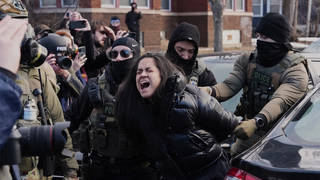
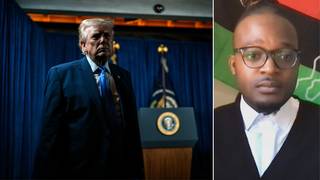

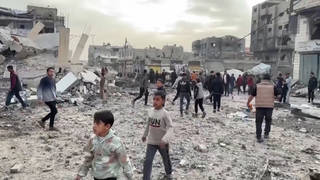





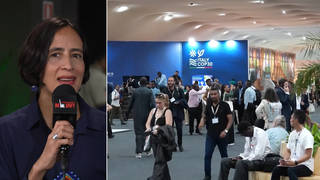

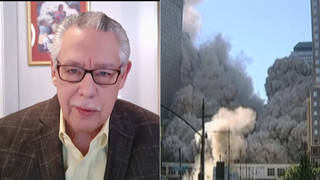
Media Options